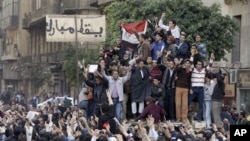Online communication tools played a huge role in recent government changes in Tunisia and Egypt. But they also showed how easily governments can interrupt Internet traffic and cell phone transmissions. VOA’s David Byrd has this look at the future of online communications in the Middle East, and how more of the control is moving from the government to the people.
The turmoil in the Middle East - including the recent “revolutions” in Tunisia and Egypt - have highlighted the role of technology - including the Internet and mobile devices. Social media - including Facebook and Twitter - also played large roles in both Egypt and Tunisia.
Government's online action
But both revolutions also showed how governments can still cut off communications.
Jillian York is with the Berkman Center for Internet and Society at Harvard University in Cambridge, Massachusetts. She says that the Tunisian government used old-school “Phishing” attacks to get Facebook user’s passwords and hijack their accounts.
“A user would try to log in to Facebook.com and would be redirected to a page that looked just like the login page, “ she said. “When they logged in, their password was captured and their account was thus taken away from them.”
Facebook eventually responded by implementing secure servers or “https” accounts for its users. The social networking site also put up a roadblock that asked users to identify people in their photos in order to log in. The solution took less than a week, but many accounts had been compromised.
In Egypt, the government action was deeper and more widespread. The government-owned Telecom Egypt controls nearly all the fiber optic cables on which Internet service providers were required to lease space.
Egypt’s internal networks also relied on information services located outside the country, including e-mail servers at Google, Yahoo, and Microsoft. By cutting off contact with the outside world, the government crippled internal communications as well.
Activists in Egypt found ways around the shutdown by using self-purchased satellite dishes to watch television coverage of events. After five days Internet and cell service was restored. But similar government-sponsored service interruptions controls have occurred in Iran, Syria, Iraqi Kurdistan and elsewhere in the Middle East.
Michael Rubin is a resident scholar at the American Enterprise Institute in Washington. He told VOA that governments’ grip on communication will be loosened as technology gets smaller and more sophisticated.
“We are going to see a miniaturization of Internet Service Providers and satellite receivers and satellite phones and the means for independent communication,” Rubin said. “At the same time, we are going to see the governments trying to come up with jamming technologies which will prevent ordinary people from having an independent communications platform.”
Luke Hutchison is a PhD candidate at MIT in Cambridge, Massachusetts, specializing in computer science and computational biology. He says one way that people can get around government control is smaller networks, including peer-to-peer sharing.
“So you could have a string of laptops where each laptop was only in range of one laptop down the valley and one laptop up the valley, but it would bounce an Internet signal from laptop to laptop all the way up the valley,” he said.
“So at the very top of this valley you could get a signal that had been transmitted along say 20 laptops. So these sorts of networks show a lot of promise for future communications,” he added.
Michael Rubin also says people could set up their own Internet networks using satellite up-links to dial into servers outside their country.
“For example, when Syrians wanted to use Internet illegally, often times what they would do is simply dial into Lebanese Internet Service Providers,” he said.
“The question is for example whether the Libyans will someday be able to access directly Italy’s servers or France’s servers - whether technology is going to be constrained by borders or whether borders are going to become irrelevant when it comes to networks,” Rubin added.
'Kill switch'
But Luke Hutchison says governments can still maintain a so-called “kill switch” particularly if the government owns or licenses the communications networks or fiber optic cables.
In some cases, governments control the infrastructure to which social media are connected - as it did in Egypt and still does in countries like China, Iran and Syria - and Internet access can be hindered. Authoritarian regimes can also use the same tools - Internet pages, SMS, and mobile devices - to rally their supporters. There are still also places where the so-called information superhighway is limited to a virtual one-lane road.
The Chinese government used a so-called “choke point” in 2009 to shut down Internet and cellular service during unrest in the Xinjiang region of western China. But Hutchison said that people who are determined to exercise their civil rights will still find ways to communicate.
“Once you have tasted freedom, particularly information freedom, it is very difficult for someone to take that away from you,” Hutchison said.
“China is an interesting case. More and more you see Chinese citizens not just sitting back and accepting the injustices they see around them but actually saying something and doing something about it. And more and more the government is stepping back and not allowing that control to take place,” Hutchison said.
Ways around
Jillian York of the Berkman Center says that even if governments try to block Internet communication, there are ways around the interference.
“Even with Facebook or Twitter being blocked, there are numerous ways to get around that,” she said.
“There are circumvention tools, when https is enabled it is very difficult and unlikely that a government is going to block all https communications. And there are also projects like the Tor project that provides both anonymity and circumvention,” York added.
Mobile devices are getting smaller and more powerful. With the advent of smart phones like the iPhone and Android devices in the Middle East, people are carrying more power in their back pocket than rooms full of machines could generate a generation ago. New media have given the world a window into what is happening on the ground in countries like Tunisia, Egypt and Libya. But whether governments in the region will embrace new media or resist them remains an open question.







